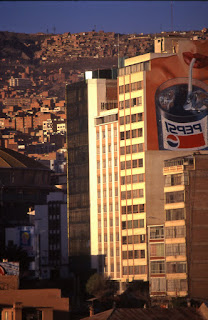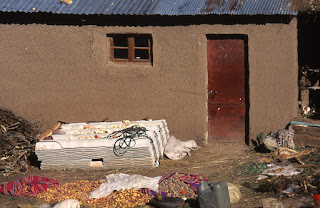I exited the plane at the airport near La Paz, and was disconcerted to see a little girl vomiting on the pavement. Little did I know that would soon be me.
The bowl of La Paz was the most fascinating thing I had ever seen, and the taxi descended to my hotel where I was to start my FAM trip, meet the guide and other guests.
It was a bit hurried; as soon as I got there we left for some ruins. Stone faces looked out from walls in grim fashion, and I started to get a headache, which wouldn’t go away.
Back at the hotel the guide, Sergio Bolivian, told me to drink some coca tea and go to bed, which I did.
The next day we set out for Copacabana and Lake Titicaca. It was a stark but beautiful scene, and a majestic temple like building stood out amongst the flats terrain.
We set up our tents while the guides assembled the Kleppers…they were having a hard time and I offered
to help, but they didn’t want any help.
to help, but they didn’t want any help.
Meanwhile, I started to feel nauseous, and the guide told me to make myself throw up and I would feel better. I complied, and went to bed.
In the morning we had breakfast and launched the kayaks. I found I had no energy, unusual as I was a kayaking guide and instructor, and all the boats were paddling away without me.
Eventually a motorboat with Carlos came and picked me up. He was a handsome man who came from a wealthy family – they had a paint company in La Paz. He offered me chocolate and a Cuba Libra, with run from Cuba. I had a feeling I shouldn’t drink alcohol, but it seemed so exotic that I had a couple of sips.

I was motored to our destination and set-up camp. I rested in my tent and watched some pretty women in colorful, large skirts head our way on a path. I thought they were heading home, but actually they were coming to us to sell jewelry. My tent-mate flashed some money and they didn’t want to leave the door of the tent, poking their heads inside and reaching out with their hands. All I could do was roll over.
The next day we went to a village on a different island and it was humming with industry. Stone steps built in ancient times went up a hill steeply, giving access to agricultural terraces. A little clear running creek ran down the side for irrigation.
We walked by a mud building that showcased potatoes and guinea pigs for sale, both a staple in the diet.
Potatoes come in all shapes and styles, often being preserved on the surface of the earth. Guinea pigs are used by local doctors – they run over the body of a sick person, and then are dissected by the doctor to discover the ailment.
Onward to the next camp – we arrived and heard that one of our local guide trainees had flipped his kayak when leaving the shore of the island and lost his glasses. He came to our camp late, extremely worried as he couldn’t see much and the glasses were expensive.
 Three hours later someone came to our camp, a long trip for them, to deliver the glasses – it seems they had several people diving into the lake to look for them.
Three hours later someone came to our camp, a long trip for them, to deliver the glasses – it seems they had several people diving into the lake to look for them.
We boarded a bus in the morning and as I had been getting sicker and sicker they put me in the back to lie
down. It was a treacherous trip; we heard one bus had gone over the edge the day before. My body was bouncing off the seat, and I was getting worse with altitude sickness by the minute.
down. It was a treacherous trip; we heard one bus had gone over the edge the day before. My body was bouncing off the seat, and I was getting worse with altitude sickness by the minute.
Back at the hotel I was put in a room to myself. Everyone had gone out to dinner. Ironically a woman I knew from Seattle, Mimi, was on the trip, and I kept hoping she or someone else would stop by.
There was a knock on the door and a man who said he was a doctor came in. He only spoke Spanish. He said he was going to give me a shot for pain and where did I want it, in my arm or my bottom. I told him I didn’t want a shot. He gave it to me anyway along with some prescriptions, and then asked for forty dollars American. I thought this was preposterous. I had to crawl across the floor to get it from my pack.
The next day I was put into a white van to go to the rustic lodge with three other guests. The rest of the group was going to hike the Inca Trail.
The driver was a flirtatious guy who had been out with our guide drinking all night. We hoped that he could drive to the lodge without an accident.
We crested the Andes (I think), and I needed a rest stop. There were no buildings, so I walked to the edge of a lake to have some privacy, and I my way back I realized this is where everyone else goes to the bathroom too.
There was a dog sitting at the top of the pass – he was put there for good luck and was waiting for handouts.
We wound down into the jungle and came to a beautiful lodge furnished with antiques, with a large dining room, swimming pool and a group of cabanas.
An elderly man was flirting with me and throwing me kisses that I thought a bit too sexist.
My tent mate and I were happy in our new quarters and went to have dinner – a lovely tomato soup with quinoa grains floating delicately on top. The bartender was very young, and had created a sketch book of cocktails and recipes; I told him he should publish it.
At some point the elderly gentleman found out I was sick and told me he was a doctor and could help me. After his original display of affection I told him I didn’t want him to come near me, and shocked he said “tu no molestar, tu no molestar”. He was really such a nice gentleman – and the top pulmonary physician of the country. He had worked with people in the mines.
After evaluating my lungs, he walked me to his cabin and took some ampicillin from a suitcase of drugs in the closet. We then walked to a tiny cemetery and he showed me his wife’s grave while he held my hand. She had fallen though the bridge over the river and died. The plot next to hers was his.
The ampicillin was as if someone took an eraser to my lungs; every day I could breath a bit better. What a godsend.
Eventually the rest of the group showed up from their trek. We had another meal and then set off to go whitewater kayaking. We stopped at a family home and I remember having a miraculous conversation with an elderly man in Spanish. I felt like I was in a bubble as he described his life to me, and how the only way to visit was to come on the big trucks over the little dirt roads, hanging on the sides.
We set off and found kayaks waiting for us at the top of a steep gorge. We got them to the bottom and found a man collecting and killing butterflies.
The river looks to be a class 2 or 3. Carlos was there, and we set off with him in a kayak. He didn’t know how to stay upright and flipped many times. I was aghast at the safety on the trip, but they said things were different in Bolivia, the US being overly cautious.
We then boarded a van to head back to La Paz…it was a long trip and it grew dark. Eventually we heard the sound of an animal wining, and it turns out someone had put a puppy in a box and tied it to the edge of the cargo rack. We rescued the poor thing and tried to stop it from shivering.
We were sleeping, finally, and found we were stopped at a roadblock. There was a curfew in the city do to some unrest, and we weren’t allowed to go forward. The guide negotiated for a couple of hours and we were finally allowed past.
The end of the trip arrived – I was both happy, relieved and a bit sad to have an end to such an adventure with nice people.
I booked myself into the Hotel Presidente. I had spoken to the editor of Summit Magazine before I left and he had told me if I took a good picture of the mountain Winopotosi, he would put it on the cover…
At the front desk I asked the concierge if I could go out there – he said, hurry, there are newlyweds in a taxi going there right now – go ask if you can join them.
I’m not sure what they thought, but the Japanese newlyweds let me into the car. We dropped them off of to go on their celebratory climb, and I got some fairly good images. We hurriedly went back to the city.
We did see a woman in the middle of nowhere putting rocks across the road – she was trying to stop the cars from going to the mountains. The driver told me not to try and take her picture, as she would throw a rock through the window.
We stopped for a minute at a cemetery of miniature houses. We had gone by an old mine and saw chemicals all over the ground. The cemetery was for the workers – each person had a little house it was resting in, and llamas were grazing around them.
What an unusual experience it all was, I watched La Paz get smaller and smaller as I flew out the next day. It took another six weeks for me to return to full health, but if I was able to do it all over again, I would, although I'd spend more time acclimating.












No comments:
Post a Comment